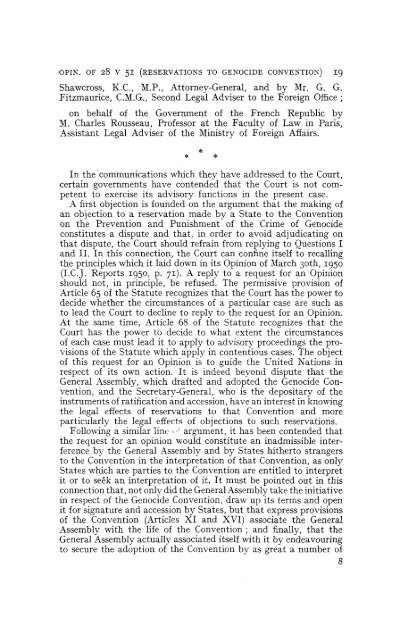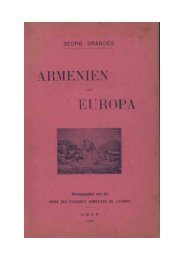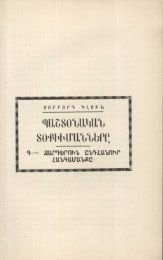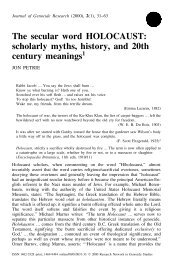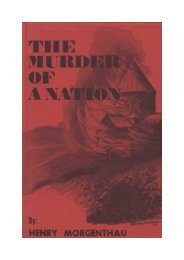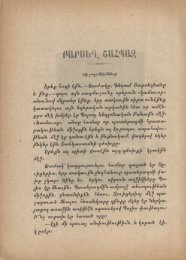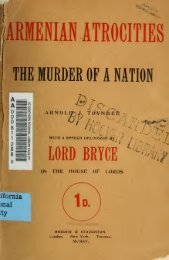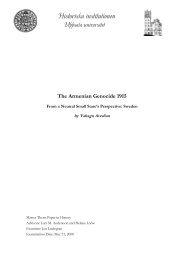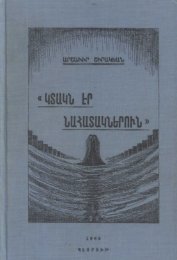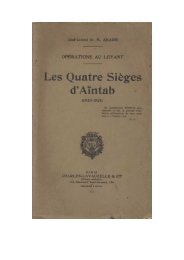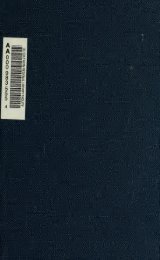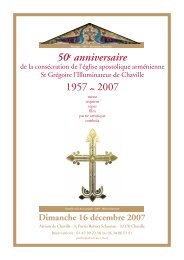Avis consultatif du 28 mai 1951 - Cour international de Justice
Avis consultatif du 28 mai 1951 - Cour international de Justice
Avis consultatif du 28 mai 1951 - Cour international de Justice
- No tags were found...
Create successful ePaper yourself
Turn your PDF publications into a flip-book with our unique Google optimized e-Paper software.
Shawcross, K.C., M.P., Attorney-General, and by Mr. G. G.Fitzmaurice, C.M.G., Second Legal Adviser to the Foreign Office ;on behalf of the Govemment of the French Republic byM. Charles Rousseau, Professor at the Faculty of Law in Paris,Assistant Legal Adviser of the Ministry of Foreign Affairs.In the'communications which they have addressed to the <strong>Cour</strong>t,certain governments have conten<strong>de</strong>d that the <strong>Cour</strong>t is not cornpetentto exercise its advisory functions in the present case.A first objection is foun<strong>de</strong>d on the argument that the making ofan objection to a reservation ma<strong>de</strong> by a State to the Conventionon the Prevention and Punishment of the Crime of Genoci<strong>de</strong>constitutes a dispute and that, in or<strong>de</strong>r to avoid adjudicating onthat dispute, the <strong>Cour</strong>t should refrain frorn replying to Questions 1and II. In this connection, the <strong>Cour</strong>t can confine itself to recallingthe principles which it laid down in its Opinion of Rlarch 3oth, 1950(I.C.J. Reports 1950, p. 71). A reply to a request for an Opinionshould not, in principle, be refused. The permissive provision ofArticle 65 of the Statute recognizes that the <strong>Cour</strong>t has the power to<strong>de</strong>ci<strong>de</strong> whether the circumstances of a particular case are such asto lead the <strong>Cour</strong>t to <strong>de</strong>cline to reply to the request for an Opinion.At the same time, Article 68 of the Statute recognizes that the<strong>Cour</strong>t has the power to <strong>de</strong>ci<strong>de</strong> to what extent the circumstancesof each case must lead it to apply to advisory proceedings the provisionsof the Statute which apply in contentious cases. The objectof this request for an Opinion is to gui<strong>de</strong> the LTnited Nations inrespect of its own action. It is in<strong>de</strong>ed beyond dispute that theGeneral Assernbly, which drafted and adopted the Genoci<strong>de</strong> Convention,and the Secretary-General, who is the <strong>de</strong>positary of theinstruments of ratification and accession, have an interest in knowingthe legal effects of reservations to that Convention and moreparticularly the legal effects of objections to such reservations.Following a similar line ; argument, it has been conten<strong>de</strong>d thatthe request for an opinion would constitute an inadmissible interferenceby the General Assembly and by States hitherto strangersto the Convention in the interpretation of that Convention, as onlyStates which are parties to the Convention are entitled to interpretit or to seék an interpretation of it. It must be pointed out in thisconnection that, not only did the General Assembly take the initiativein respect of the Genoci<strong>de</strong> Convention, draw up its terrns and openit for signature and accession by States, but that express provisionsof the Convention (Articles XI and XVI) associate the GeneralAssembly with the life of the Convention ; and finally, that theGeneral Assembly actually associated itself with it by en<strong>de</strong>avouringto secure the adoption of the Convention by as great a number of8


